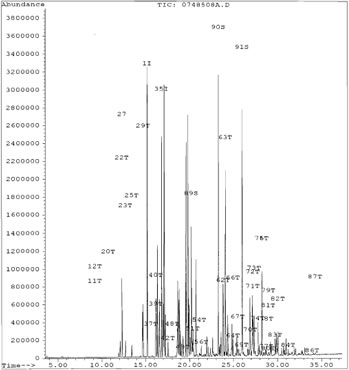SOIL VAPOR EXTRACTION WELL
FEASIBILITY STUDY:
SOIL VAPOR SAMPLE ANALYSIS
$35.95 (US)
(470 Pages: Text + Illustrations)

As part of its Soil and Water Investigation conducted
pursuant to California Code of Regulations Section 2725(f), the Responsible
Party in a soil and groundwater contamination case at a former gasoline
service station site conducted a feasibility study to evaluate vacuum
extraction of contaminants from soil and groundwater as a remedy for actual
or potential adverse effects of an unauthorized release.
This report describes the results of a Soil Vapor
Extraction Feasibility Study which was conducted to determine whether soil
vapor extraction could accomplish removal of contaminant mass at sufficient
rates, such that if carried out over a longer time period the method would
have the potential to achieve significant remediation. Parameters necessary
for the installation of a permanent SVE system such as Radius of Influence
(ROI; maximum distance from test extraction well at which magnitude of the
measured vacuum is at least 1% of the vacuum applied at the test well), and
a determination of the total number of SVE wells required in the final
installation at the former gas station site, were estimated in this report
from the data presented. MTBE Hydrocarbon Removal Rate, Efficiency of
Contaminant Mass Recovery and Total Petroleum Hydrocarbon are also estimated from the data presented in this report.
CONTENTS
I. Summary
II. Analytical Methods
A. EPA Compendium Method TO-15:
1. Method Description
B. Compendium Method TO-15:
Method Protocol
1. Soil Vapor Extraction Apparatus
and Pilot Test Procedure
2. Vapor Sample Collection
in Summa Canisters
3. Addition of Internal and
Surrogate Standards
4. Quality Control Samples
5. Calibration Standards:
Initial and Continuing
C. EPA Compendium Method TO-3
1. Method Description
2. Initial and Continuing Calibration
3. Quality Control Samples
4 .Preparation of Soil Vapor
Samples for Gas Chromatography
D. Chain of Custody
III. Discussion
A. Soil Vapor Extraction Step Test
1. Test Well SVE-1
2. Test Well SVE-2
3. Test Well SVE-3
4. Determination of Radius
of Influence
5. Number of SVE Wells
B. SVE Constant Vacuum Pressure
Extended Test
1. Test Well SVE-3
2. Hydrocarbon Removal Rate
C. Vapor Sample 1-1
1. Quantitation Report and Total
Ion Gas Chromatograph
2. Presence of Internal and Surrogate
Standards
3. Quantitation of Target Compounds
D. Vapor Sample 1-2
1. Quantitation Report and Total
Ion Gas Chromatography
2. Presence of Internal and Surrogate
Standards
3. Quantitation of Target Compounds
E. Vapor Sample 1-3
1. Quantitation Report and Total
Ion Gas Chromatograph
2. Presence of Internal and Surrogate
Standards
3. Quantitation of Target Compounds
F. Vapor Sample 2-1
1. Quantitation Report and Total
Ion Gas Chromatograph
2. Presence of Internal and Surrogate
Standards
3. Quantitation of Target Compounds
G. Vapor Sample 2-2
1. Quantitation Report and Total
Ion Gas Chromatograph
2. Presence of Internal and Surrogate
Standards
3. Quantitation of Target Compounds
H. Vapor Sample 2-3
1. Quantitation Report and Total
Ion Gas Chromatograph
2. Presence of Internal and Surrogate
Standards
3. Quantitation of Target Compounds
I. Vapor Sample EX-1
1. Quantitation Report and Total
Ion Gas Chromatograph
2. Presence of Internal and Surrogate
Standards
3. Quantitation of Target Compounds
J. Vapor Sample EX-2
1. Quantitation Report and Total
Ion Gas Chromatograph
2. Presence of Internal and Surrogate
Standards
3. Quantitation of Target Compounds
K. Vapor Sample EX-3
1. Quantitation Report and Total
Ion Gas Chromatograph
2. Presence of Internal and Surrogate
Standards
3. Quantitation of Target Compounds
IV. Mass Spectral Identification and Confirmation
of MTBE, Ethylbenzene, Benzene and Xylenes
in Soil Vapor Samples
A. SVE Vapor Samples 1-1, 1-2, 1-3,
2-1, 2-2, 2-3, EX-1, EX-2, EX-3
1. Soil Vapor Sample 1-1
2. Soil Vapor Sample 1-2
3. Soil Vapor Sample 1-3
4. Soil Vapor Sample 2-1
5. Soil Vapor Sample 2-2
6. Soil Vapor Sample 2-3
7. Soil Vapor Sample EX-1
8. Soil Vapor Sample EX-2
9. Soil Vapor Sample EX-3
V. Quality Control Testing: EPA Compendium
Method TO-15
A. Daily Analytical Batch #092507-MS3
1. Method Blank
2. Continuing Calibration Verification
3. Laboratory Control Spike and
Spike Duplicate
B. Daily Analytical Batch #092607-MS3
1. Method Blank
2. Continuing Calibration Verification
3. Laboratory Control Spike and
Spike Duplicate
VI. Analytical Results: EPA Compendium
Method TO-3
A. Soil Vapor Sample EX-1
1. Quantitation Report, Area Percent
Report and Gas Chromatograph
2. Quantitation of TPH in Soil
Vapor Sample EX-1
B. Soil Vapor Sample EX-2
1. Quantitation Report, Area Percent
Report and Gas Chromatograph
2. Quantitation of TPH in Soil
Vapor Sample EX-2
C. Soil Vapor Sample EX-3
1. Quantitation Report, Area Percent
Report and Gas Chromatograph
2. Quantitation of TPH in Soil
Vapor Sample EX-3
VII. Quality Control Testing; EPA Compendium
Method TO-3
A. Daily Analytical Batch #092707-GC1
1. Method Blank
2. Continuing Calibration Verification
3. Laboratory Control Spike and
Spike Duplicate
4. Laboratory Control Spike Duplicate
B. Daily Analytical Batch #092807-GC1
1. Method Blank
2. Continuing Calibration Verification
3. Laboratory Control Spike and
Spike Duplicate
4. Laboratory Control Spike Duplicate
EXHIBITS (1-34)
$35.95 (US)
|